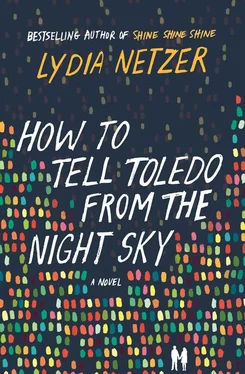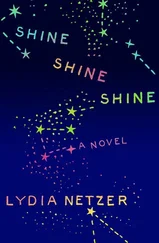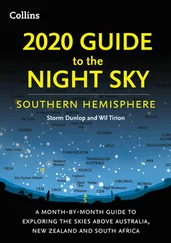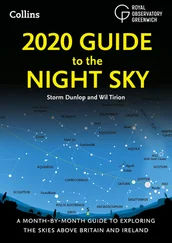Now the gorgeous, glowing creature in the air of the lecture hall was nodding, nodding, her sweet curves dancing a slow dance for him. This was the thing he could not tell anyone, in the lecture hall, in the office, in his weekly report to the chair of the department at their meeting in his office: “Hi, Dr. Sanji. My work on the latest astrometric project proceeds apace, and, oh, also I see gods floating around sometimes. I yield the floor to Dr. Jones.”
Religion is private. It’s a private matter between you and the dozen or so deities who visit you at the most inopportune moments.
George grasped the podium with both hands and squinched his eyes very tight. Then he looked around again at the class. They were sitting up straight, their eyes lit up, on full alert. Something was happening—they had figured out. A real astronomer was now speaking to them, here at the Toledo Institute of Astronomy, where they had come to be educated by real astronomers. They leaned forward, eager to hear what he would say next. George looked all around the room, everywhere else except her curves and colors. “If they fall into disrepair, do we have to retroactively call ourselves unbelievers? Are we stupid? Are we duped? If it happened to Ra, it could happen to anyone! Ra was an ass kicker. Ra was the sun god! How could this happen to Ra?”
No one raised a hand. The girl who looked like Lara Croft had now fully changed into the brilliant, irresistible form of a goddess with whom he was quite familiar. She had appeared to him before, but never at work. Now she climbed astride the long fluorescent light fixture near the ceiling, swinging from side to side, using her long braids like fishing lines to dangle in front of unsuspecting students. She laughed silently, but George could hear her, could remember her voice, telling him exactly what to do. The goddess of sex. American pantheon. Contemporary era. His head creaked in pain and he smelled cinnamon, like a very strong exotic tea.
“Maybe—” George paused. He began to move around on the stage, back and forth, trying not to gaze into the space above their heads. The god of sex swung her legs gleefully, biting her lower lip and waving at him. Hi, George, she seemed to be communicating. I’m up here.
“Maybe Ra was sucked into a wormhole,” George said. “Or maybe he just went back willingly into the wormhole from whence he originally came. Something has to happen at the other end of a wormhole, otherwise where the hell is your conservation of matter and energy? Nowhere, that’s where!”
Students were nodding. The girls were smiling. Someone’s book fell onto the floor and it wasn’t retrieved. A boy in the back row chewed a pencil between his teeth. “Could you believe that a wormhole might end in an ancient ziggurat?” George continued. “A cathedral in France? A human uterus? Maybe I’m asking for a looser interpretation of matter conservation than the one you’re willing to give.”
George was pacing faster now, and the sex goddess was swinging faster, his long limbs eating up the stage at the front of the hall, her body flowing over the light fixture and dripping onto the floor below. The students peered at him wide-eyed. Some of them had their mouths open. He would push the idea into the mouth, close the chin, stroke the throat. Even if the idea was blatant lunacy, they would try to swallow. He had that going for him: a certain charisma, a magnetic charm. But if he said, “Observe, above your heads: a modern deity. Observe.” Would they look up? Would they nod and smile, and write down points? He brushed his hair out of his face and turned a winning smile on them. He spread his hands out, long arms wide, a crisp white shirt illuminated in the stage lights over his khakis and loafers.
“George!” called the goddess from the ceiling. He ignored her. He tried to ignore the idea of her. “Tell them!”
“Maybe I’m asking you to believe in the conservation of gods and godliness. Is that too altogether impossible to believe?”
The class waited.
“Think about it. Nothing comes from nothing!” George implored.
The class tilted their heads to the right.
“There has to be a doorway from which they all crawled out, and then into which they all crawl back. There is a supermassive black hole at the center of our galaxy, kids. What’s it doing over there, just killing time chewing up asteroids? It’s flaring. X-ray flashes: do you know what makes them? NASA doesn’t. I don’t.”
The rows of eyes were all locked on him, each little light devouring his words, none of them drooping down to look at laptops or checking out the other students in the next row. Was it his smile, his apple cheeks, the curve of dark hair on his noble brow? Was it the god above, directing the traffic between their ears? George was the tallest astronomer in Toledo. He was broad-boned and firm as a rock. He returned to the center of the stage. The words came out of his mouth without his intervention. He felt the odd but familiar sensation that he was talking for the goddess, that she was now putting words in his throat for sport, and then pulling them out on a string.
The door at the back of the lecture hall banged open and George could see, standing there, one of the older professors, his boss. Why was he here? To observe the class? To fire George? To find out if George was just a mouthpiece for a god?
“Who sang before the angels sang? In what shape did the stars align themselves, before they took the shape of Greek prophets, Roman warriors, and such? Where did the first flint-reaping knife drop from a weathered hand, so the hand could take a copper idol? Who built the temple of Eridu?”
What the hell is Eridu? thought George. He felt the panic coming on. He felt his brain was not his own. He would lose his job. He would lose his mind. This lecture had gone completely off the rails. The sexy goddess on the light fixture shrugged at him and made a kissy face. George took himself back behind the podium, put his fingertips together lightly and inclined his head, as if to say, Namaste. Good-bye. He gave a weak smile to the professor at the door. But the class breathed in, breathed out, waiting for him to finish. They wanted him to say one more thing. But what would it be? What could it be?
He opened his mouth and out came, “What is history but a list of kings?” He decided that was the end of the lecture. It wasn’t safe to say any more. He gave a final emphatic nod.
Silence hung in the room. The students picked up their books and left, whispering to each other, glancing back at George in amazement. The History of Astronomy class at the Toledo Institute of Astronomy was required for all incoming students. He was its most popular teacher, and this fall was his sixth time teaching it. Usually on the first day, there were no gods in attendance. Usually he stayed in control of his language. And his head didn’t hurt as much.
“You’re wasting your talents there,” his mother had said. “Take a hundred dollars. Get a haircut.”
His mother didn’t like him spending his time teaching freshmen. She didn’t like his car. She didn’t like the girls he typically pursued. His mother actually wanted him to leave Toledo entirely.
“You’re not happy here, George, and you never have been.”
“But I will be,” he would say.
“But you aren’t,” she’d respond. “I just need to point that out.”
His mother was a lawyer. Pointing things out was her specialty. But George knew she was wrong. He would be happy.
The professor at the back of the room strode quickly up to the podium, as the students filed out.
“Dr. Bryant,” said George, by way of greeting. What more could he say?
Dr. Bryant had been much published, quoted, and admired. Dr. Bryant had never been asked to teach the undergraduate History of Astronomy class, or lecture from a textbook, or speak to freshmen. He never would have done it, either. But now the older astronomer was panting, sweating, and rushing down the aisle.
Читать дальше












